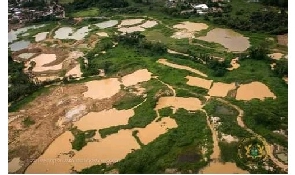 An aerial view of a galamsey site: File photo
An aerial view of a galamsey site: File photo
Dr. Kwabena Okyere Darko-Mensah, Western Regional Minister, has said government is determined to sanitise the small-scale mining industry in spite of all obstacles. He noted that sanitising the small-scale mining can sustainably contribute to the nation’s socioeconomic growth and preserve its abundant resources for today and future generations. “On the steps taken to curtail ‘galamsey’ activities and boost revenue in the small-scale mining industry, the Deputy Minister for Lands and Natural Resources, George Mireku Duker, has announced that government will soon launch the ‘situational room’ to remotely monitor and manage on-the-ground operations across the nation” he hinted. Through this arrangement, he said, the activities of miners and their equipment will be tracked and digitally relayed to the Minerals Commission office. This will complement the deployment of river guards to permanently patrol river-bodies such as the Offin, Ankobra and Pra. Also, he said, the Community Mining Scheme and launch of the National Alternative Employment and Livelihood Programme (NAELP) are being implemented to promote environmentally friendly mining practices and create more opportunities for the youth. “We therefore believe that increasing private sector participation in the form of direct investment, exploration, financing, research and technology transfer will help to make this a reality,” he added. Dr. Darko-Mensah was speaking at the 10th ALUMaT Lecture, which coincides with the 70th Anniversary Lecture of the University of Mines and Technology in the Western Region. It was on the theme ‘Practical Insights into Growth of the Mining Industry in Ghana: Perspectives of a UMaT-Trained Female Engineer’. He was happy to state that the mining industry has been exposed positively as a formidable sector for long-term economic growth at the 2020 Ghana Gold Expo and the 2021 and 2022 Mining Week, especially with a tougher regulatory framework and rising formalisation. “As I speak, the Bank of Ghana has started its responsible sourcing programme under its local Gold Buying programme, which will help enhance formalisation of the small-scale sector. Also, Gold Coast Refinery became the first refinery in West Africa to obtain a Responsible Jewellery Council (RJC) Certificate,” he said. He noted it is more appropriate for the region that mines and produces gold, among others, to act as the focal point for ethical mining and mining-related activities. Dr. Darko-Mensah therefore called on Small-scale Miners Associations to take up the responsibility of reclaiming degraded lands by replanting to save the businesses and five million jobs in the sector. After all, we will not allow the mining business to collapse. Again, he called for the transfer of Reclamation bonds from the Minerals Commission in Accra to District Assemblies through the now activated District Mining Committees to support reclamation efforts of small-scale mining participants. He said the complete decentralisation of mining licencing and an in-situ mobile licencing regime to help legalise and control more mining activities – especially those that do not fall within the red zones of water-bodies and forest reserves – should be looked at critically.
Dr. Kwabena Okyere Darko-Mensah, Western Regional Minister, has said government is determined to sanitise the small-scale mining industry in spite of all obstacles. He noted that sanitising the small-scale mining can sustainably contribute to the nation’s socioeconomic growth and preserve its abundant resources for today and future generations. “On the steps taken to curtail ‘galamsey’ activities and boost revenue in the small-scale mining industry, the Deputy Minister for Lands and Natural Resources, George Mireku Duker, has announced that government will soon launch the ‘situational room’ to remotely monitor and manage on-the-ground operations across the nation” he hinted. Through this arrangement, he said, the activities of miners and their equipment will be tracked and digitally relayed to the Minerals Commission office. This will complement the deployment of river guards to permanently patrol river-bodies such as the Offin, Ankobra and Pra. Also, he said, the Community Mining Scheme and launch of the National Alternative Employment and Livelihood Programme (NAELP) are being implemented to promote environmentally friendly mining practices and create more opportunities for the youth. “We therefore believe that increasing private sector participation in the form of direct investment, exploration, financing, research and technology transfer will help to make this a reality,” he added. Dr. Darko-Mensah was speaking at the 10th ALUMaT Lecture, which coincides with the 70th Anniversary Lecture of the University of Mines and Technology in the Western Region. It was on the theme ‘Practical Insights into Growth of the Mining Industry in Ghana: Perspectives of a UMaT-Trained Female Engineer’. He was happy to state that the mining industry has been exposed positively as a formidable sector for long-term economic growth at the 2020 Ghana Gold Expo and the 2021 and 2022 Mining Week, especially with a tougher regulatory framework and rising formalisation. “As I speak, the Bank of Ghana has started its responsible sourcing programme under its local Gold Buying programme, which will help enhance formalisation of the small-scale sector. Also, Gold Coast Refinery became the first refinery in West Africa to obtain a Responsible Jewellery Council (RJC) Certificate,” he said. He noted it is more appropriate for the region that mines and produces gold, among others, to act as the focal point for ethical mining and mining-related activities. Dr. Darko-Mensah therefore called on Small-scale Miners Associations to take up the responsibility of reclaiming degraded lands by replanting to save the businesses and five million jobs in the sector. After all, we will not allow the mining business to collapse. Again, he called for the transfer of Reclamation bonds from the Minerals Commission in Accra to District Assemblies through the now activated District Mining Committees to support reclamation efforts of small-scale mining participants. He said the complete decentralisation of mining licencing and an in-situ mobile licencing regime to help legalise and control more mining activities – especially those that do not fall within the red zones of water-bodies and forest reserves – should be looked at critically.